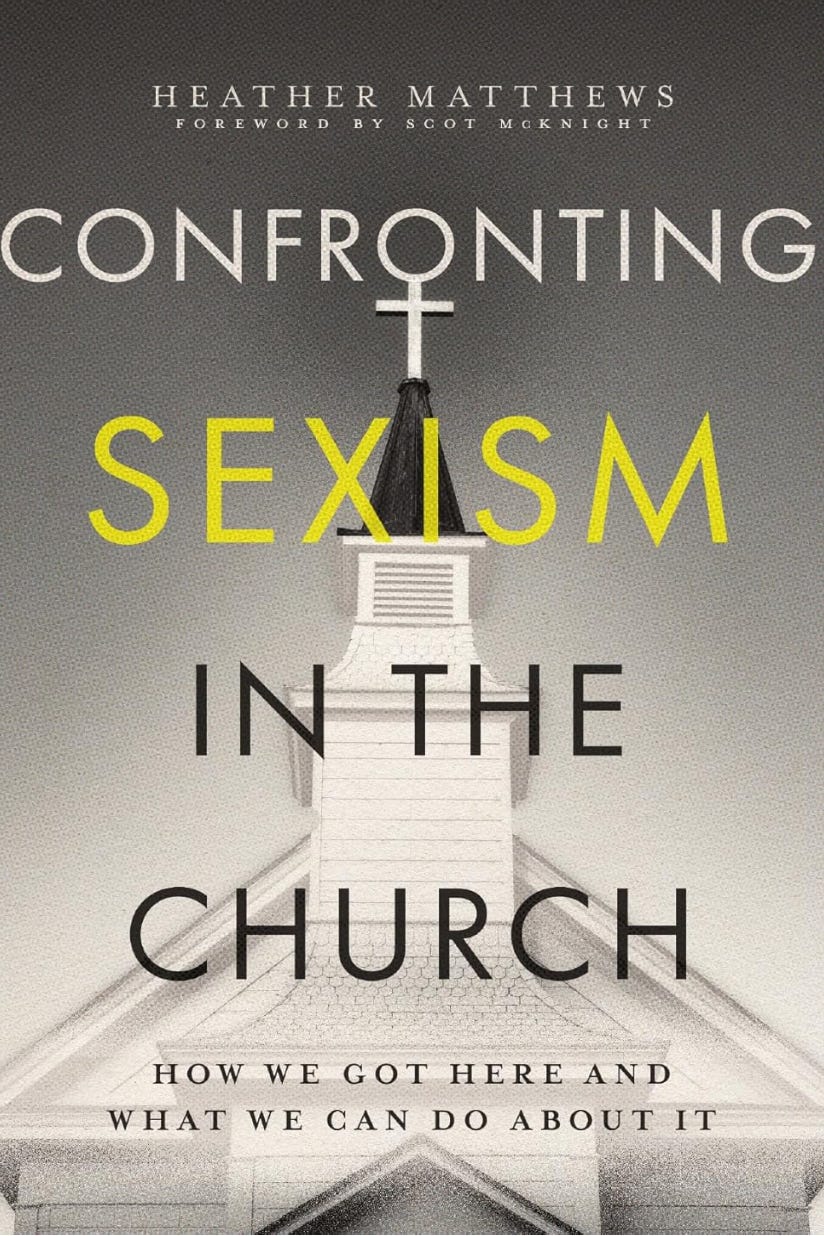Benevolent Sexism
By Melissa Pillman, a response to a chapter in Heather Matthews, Confronting Sexism in the Church
My friend had warned me before my book even arrived: “Give yourself some extra time for reading this one, because the memories will be a bit exhausting.” She was right. As I read Heather Matthews’ descriptions of the breadth of ways that we experience sexism in our culture, an unwelcome slideshow started to play in my mind. The sexual harassment in high school that we didn’t have the words for – we just thought it was vulgar flirting. The feeling of wanting to shrink in my chair as the only woman at the conference table when the conversation turned “joking” about female body parts, only realizing later that I had experienced a microaggression. The covert sexism of having a friend attribute my idea to a male peer, and feeling invisible in the room as he allowed it to happen uncorrected. Matthews’ book gave clear and helpful names to accompany the moments running through my mind’s slideshow, and indeed I needed to build in time to pause in my reading, to allow the memories to come, and to give myself space to feel the hurt again. Her writing clarified the nuance of these experiences of sexism, and validated their impact in how I viewed myself as a woman. She powerfully exposes the prevalence of sexism in our history, our current culture, and even in the church.
Because sexism is a part of the air we breathe. But that doesn’t make it ok. It just means that our air is polluted, and we are so used to it that we don’t even realize that we’re breathing in smog.
One powerful realization from Matthews’ writing was around “benevolent sexism.” During the early years of my service in ministry, our complementarian theology was explained as fostering the flourishing of both men and women in ministry together, while simultaneously limiting the positions women can fill and the way in which they use their God-given gifts. As I tried to navigate using my voice and my leadership gifts in my office of “part time assistant to the elder team,” I would often feel ill-fitting and awkward. I waited for my husband to want to become more involved in leadership so that I would make more sense in our structure. People would say, “you’re basically an elder’s wife” and “he’ll probably be an elder in a few years.” But my husband has never carried aspirations to shepherd the church – they weren’t seeing him at all, but simply trying to make sense of me. What was described in benevolent terms just felt stifling and confusing. I would ask God if I was supposed to stay, and the response was to wait.
So I did.
And then one day, one of the pastors decided that he wanted to restudy the role of women in ministry. As the assistant to the elders, I was the only woman at the table when he said it to the group of male elders. My eyes were as big as saucers, but I stayed silent as they discussed what would be involved in processing this question as a team. And so began a four year journey that eventually brought us to a fully egalitarian theology of men and women co-laboring in all functions for the church. Somewhere around this period of time, my slideshow took a decided turn – where the first part was marked with hurt and confusion, this portion was marked with bravery and healing.
In Chapter 8, Matthews writes about “Confronting Sexism in Relationships.” She rightly states, “Sexism is systemic, cultural, organizational, theological, and historical as well. However, a good place to start addressing sexism is in the context of relationships… In order to address sexism, we have to learn to be with one another in relationships marked by vulnerability, trust, love, openness, and repentance” (p121). This new period of our church’s story was marked with bravery to speak hard things to one another about female experiences in our “benevolent” complementarianism, and healing as the voices of hurting women were heard. And that took bravery on the part of the men as well! We needed to trust each other enough to speak hard things in love, knowing that our relationships would benefit from the work of vulnerability and repentance.
In reflecting on Matthews’ writing on “Confronting Sexism in Relationships,” I thought of my experiences of being “at the table” as we shifted from complementarian to egalitarian theology and practices, and as my title shifted from “assistant” to “elder and pastor.” First, it was men who gave me access to the table. They were in positions of authority, and they repeatedly moved aside to make room for me, my voice, my perspective, and my leadership. But they knew I had been operating at the table as an assistant, and now I was a peer. So they not only gave me access to the table, but they gave me permission at the table. (Access without full permission to participate is merely tokenism.) They sought my voice. They made room for me to process and respond, knowing that I had previously been expected to be silent. They asked me questions, or paused long enough to make sure that I had the room I needed, knowing I had previously been expected to defer to male voices. And they were humble and open enough to truly listen and respond to the experiences I shared.
I told them I had a mother’s heart for this church, but I was told the only available position was as a nanny. So I took it and nurtured the community where I could, like many other women in similar settings have to do. And that hurt. And they listened, took responsibility, and apologized.
I told them that they were processing the impact of a shift in theology, but to me this conversation impacted my personhood – how I, as a woman, would be able to operate in the church. And they listened, and thanked me for sharing my perspective. They admitted they hadn’t thought of how it would feel to be female in those conversations.
I told them it was impossible to just “read generously” when our leadership books were written only to male leaders – how we as women cannot help but realize that we’ve been written right out of the text. And they listened, and took that book off the list.
These conversations were formative, and were only made possible from the relational trust we had formed. We may not have eradicated systemic sexism in the “capital C” Church, but we made remarkable strides as a leadership team, which impacts our church community, which impacts how they engage with those around them… an anti-sexist ripple effect that starts with the pebble of authentic friendships in Christ.




Beautiful and hopeful!
Thank you for sharing Melissa’s story! Her journey will resonate with so many women. Beautifully written!